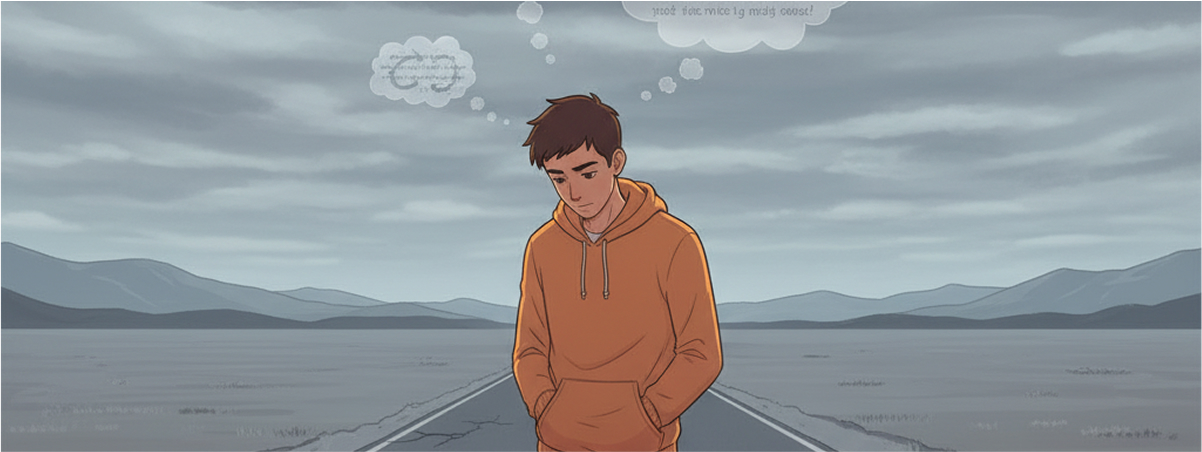"It will never work anyway." "That's just how it is, I can't do anything about it." "Why try? It's doomed from the start." Do these phrases sound familiar? If you're nodding, you might be caught in the web of fatalistic thinking.
This way of seeing the world as unchangeable and your destiny as sealed might seem protective, but it actually steals your power to act.
What is fatalistic thinking?
Fatalistic thinking is a belief that events are predetermined and completely beyond our control. People who adopt this mental pattern consider that their destiny is fixed in advance by external forces – whether it's chance, circumstances, or an implacable "fate".
This worldview transforms a person into a passive spectator of their own existence. Instead of looking for solutions or acting to change their situation, they resignedly accept what they perceive as inevitable.
5 signs of fatalistic thinking
- Language of powerlessness
You frequently use expressions like "I have no choice," "It's stronger than me," "Anyway...," "It was meant to happen". - Giving up when faced with difficulties
As soon as an obstacle presents itself, you quickly give up thinking it's useless to fight against destiny. - External attribution of all events
Your successes? It's luck. Your failures? It was written. You don't recognize any role in what happens to you, neither good nor bad. - Resistance to change
Why change habits, jobs, or relationships if "that's just how it is" and nothing can really evolve? - Generalized defeatism
You tend to discourage others by explaining why their projects are doomed to fail, reproducing your own pessimistic vision.
Where does this fatalistic worldview come from?
- Repeated failure experiences
When we accumulate disappointments despite our efforts, the brain may eventually adopt this "protective" strategy: if we expect nothing, we can't be disappointed. - Family transmission
Growing up in an environment where adults repeat "We can't do anything about it," "That's life," "People like us..." unconsciously programs this worldview. - Crises and trauma
Traumatic events can give the impression that life is uncontrollable and unpredictable, pushing toward defensive fatalism. - Socio-economic context
Certain social situations can nurture a feeling of powerlessness against "big mechanisms" economic or political, generalizing this powerlessness to all domains.
The consequences on your life
- Personal stagnation
By no longer trying anything, you deprive yourself of any possibility of improvement or evolution in your situation. - Impoverished relationships
Fatalism can contaminate your relationships: why invest in friendship or love if "anyway it always ends badly"? - Loss of meaning
This worldview can lead to a feeling of existential emptiness: if nothing has an impact, why live intensely? - Self-fulfilling prophecy
By no longer acting, you paradoxically create the failures you predicted, reinforcing your fatalistic belief.
5 strategies to overcome fatalism
- Identify your zones of control
Concretely list what you can influence in your daily life: your actions, your reactions, your choices, your efforts. Even small, these zones always exist. - Experiment with "What if..."
Replace "Anyway, it won't work" with "What if I tried? What if it worked?" Allow yourself to envision possibilities. - Celebrate micro-victories
Note every small positive change you create in your life, even minimal ones. This rebuilds your sense of personal efficacy. - Analyze counter-examples
Look in your past for moments when your actions had a positive impact. These proofs exist, even if fatalism prevents you from seeing them. - Act despite doubt
Start with very simple actions, without waiting to be convinced. The experience of effective action will gradually change your beliefs.
The power of tracking your fatalistic thoughts
An app like Anima can help you become aware of your fatalistic patterns by analyzing your speech. By identifying your automatic phrases of resignation, you can begin to question them.
Example dialogue with Anima's AI:
User: "I failed that interview again. Anyway, I'll never get a good job, it's not for people like me."
Anima: "I notice you're attributing this failure to fate rather than factors you could analyze. What specifically happened during this interview? Are there elements you could prepare differently next time?"
Thanks to this mood tracker function, you gradually develop the ability to transform your resignation into constructive curiosity.
Key takeaways
- Fatalism is a psychological protection that becomes a prison
- You always have zones of influence, even small ones, on your life
- Action, even modest, is the most effective antidote against fatalistic thinking
- Changing beliefs takes time, but starting by changing actions is already a big step
- The goal isn't to control everything, but to regain awareness of your power to act
And you, in which area of your life do you most feel this impression that "nothing can change"? Share your experience in the comments – and discover that regaining even small control can transform everything.
👉 Try Anima for free on the App Store and start transforming your thoughts today!
